
Project Management vs Construction Management
Introduction to Project Management vs Construction Management.
Welcome to HubWorld, we will be discussing about project management vs construction management. Their definitions, roles and responsibilities, required skills, industries and applications, advantages and disadvantages of project management and construction management.
What is Project Management
Project management is all about finishing tasks or carrying out a project or starting and managing a project. Another definition for project manager is scheduling a project or controlling assets or defining goals and that is involved with parties. This has to do with keeping an eye on development and to be aware of dangers. They are always on a budget and making sure the project are finished on time. They deliver their project efficiently and effectively on the given schedule.
Roles and Responsibilities of Project Management
The responsibilities of a project manager is to execute, plan, oversee and closing a project. To produce outcomes on time team members must complete the assigned tasks. The expectations of the stakeholders are to handle any issues and manage any given projects. To communicate with each other team member or stakeholder and important project personnel have to come together. To manage a project they have to put solutions into actions and keep an eye out for hazards. Also they have to identify, reduce potential risks and develop risk management plans. The key components of project management are the budget management and effective resources allocation. Communication, leaderships and effective coordination are some of the important abilities for a project manager.
Skills Required for Project Management
For a good team, member interact the clients and stakeholder to communicate well. To achieve the project objectives, a project manager will lead the team through inspiration. To adhere to deadlines they have to prioritize work and manage time. They resolve project related problems and they have the ability to handle issues. To guarantee seamless functioning the management have the ability to monitor project specifics. Through negotiations they have the ability to reach agreements and negotiate conflicts. To oversee project expenditures and budgets they have financial management and budgeting abilities. They can reduce any project hazards by utilizing the risk management. To adapt to unanticipated events they have the capacity to change course. To a particular project or sector techincal expertise are relevant.
Industries and Applications of Project Management
They execute projects of high quality, cost effective and guarantees the timely. They make use of software development initiatives and manages system installations. They can enhance patient treatment or put electronic health record systems into place and oversee clinical trials. They encourages plan expansions or process enhancements and endorsed the creation of new products. The event planning are carried out successfully or marketing initiatives and guarantees the product launches. They introduce innovative teaching tools or plans building projects for schools and create curricula.
Advantages of Project Management
Project management locates bottlenecks, streamline procedures and ensures effective resource usage. It ensures team members or clients and stakeholders have an open communication. It reduce and identify risks early on time and makes sure the project is a success. To improve stakeholder satisfaction they manages budget or scope and schedule. They make well informed decision making and organize quick procedures when needed. To improve the quality control and make sure quality standards are used throughout the project lifecycle. It ensures a scalable and flexible project executions.
Disadvantages of Project Management
They can be in a lot of stress when budgeting and trying to meet deadlines. To adjust to unanticipated changes can be more difficult due to adhering strictly to budgets and schedules. To resolve disputes between stakeholder or teammates and other parties can be difficult and time consuming. Some projects add to expenses and time due to growing bigger or more complicated than they anticipated. Inefficient resource allocation can overruns and delay budgets. Poor communication can result to disputes or project delays and misunderstanding.
What is Construction Management
The construction management reponsibilities are oversight of building projects or scheduling and manages the organization. They supervises stakeholder correspondence or financial planning or quality assurance and planning. To satisfy their clients the main objectives is to be within the budget and complete the project on time.
Roles and Responsibilities of Construction Management
Resource allocation or schedules and budget projections are part of making a comprehensive project plan. The architects or engineers or subcontractors and stakeholders all need to work together to achieved a shared objectives. They successfully manage expenses and maintain the projects financial plan. To satisfy customers and industry requirements they maintain control over the caliber of work. For risks reduction they create plans and determine the possible dangers. All parties involved in accomplishing the project objectives need to communicate effectively. They track the project schedules, establish and adhere to all needed parts. In a timely and efficient manner they solve problems or challenges to make the work easy.
Skills Required for Construction Management
All the project activities need to be on record including the budget, permits, contracts etc. The ability to identify and mitigate potential risk makes the project safe. It is necessary to create a budget, manage cost and comprehend construction materials or building codes. They are quick thinkers, able to analyze and solve problems or issues are crucial. Decision making or task delegation and effective leaderships are the essential parts of making a project successful. All parties involved in the project must have a clear view of their role and responsibilities includes team members or contractors and stakeholders. To meet up with the deadlines it is crucial to work according to the project plans.
Industries and Applications of Construction Management
They have an essential role in commercial constructions by supervising the plans, designs and construction of the buildings. They are crucial in the residential construction industry by coordinating the buildings of homes and apartments etc. They are active in large scales infrastructure projects such as bridges, highways and airports. They have key roles in industrial construction overseeing the buildings of warehouses and manufacturing facilities. They are fundamentals to healthcare facilities like specialized planning for clinics and hospitals. They are also essential in educational institutions for constructions of research facilities and universities. They play key roles in hospitality sector overseeing the buildings of resorts or restaurants and hotels. They part take in the government projects such as public buildings or transit infrastructures and municipal facilities.
Advantages of Construction Management
For a successful project completion knowledge and experience is needed. To efficiently manage the budget they need to find opportunities for cost savings. Planning and organizing every facet of the project can guarantee the project completion on time. To ensure the project requirements are met the quality control monitors the caliber of work. Acting as a liaison and providing communication ensures coordination and clear communication.
Disadvantages of Construction Management
To minimize risks in construction management the projects involves managing several facets. An unanticipated change in scope or inadequate planning and erroneous cost projections can be caused by cost overruns. An inattention to details or oversight can be a result or reworks or repairs that are expensive of high standards. To meet up with a tight deadline there should be careful preparation and collaboration.
Key Differences Between Project Management vs Construction Management
Construction management deals with buildings or infrastructure while project management deals with different types of industries. Construction management calls for materials or rules, building structures and safety procedures while project management deals with leadership or problem solving abilities and communication. Construction management always ensures the project is complete on time no matter the material shortages and weather delays.
Comparing Project Management vs Construction Management
To accomplish the particular objectives, planning, directing resources and organizing are the important aspect of project management. They comply with the schedule restrictions, cost and quality. In project management the department that focuses on building phase is called construction management. For an effective completion of a project both project management and construction management are essential.
Overlap and Integration of Project Management vs Construction Management
The timelines of their projects or goals or finances and the completion of a project are the main objectives of a project manager. While construction managers focuses on the quality control, daily operations and subcontractors. Cooperation is required for both management for the completion of a project on schedule and within the budget. Through effective integration delays are reduced, procedures are streamlined for the project goal to be achieved.
Conclusion
They involve controlling, scheduling, organizing and they require resource management. There is a specialty department that focuses on building in project management is called construction management. There is a construction management that focuses on building under the project management. Construction management primary focus is to specialize on construction fields and projects.
READ MORE ON Project Management vs Construction Management
SEE MORE ON Time Management and Procrastination: Expert Tips

